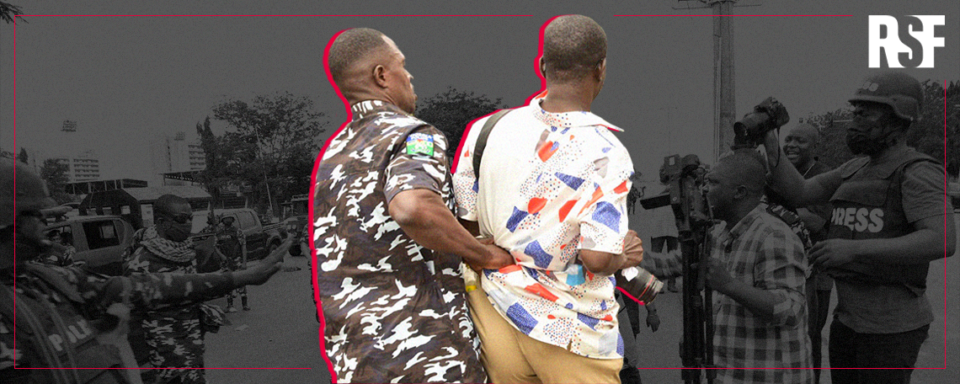Thirteen journalists have been arrested and at least 16 others attacked while covering major protests against the cost of living crisis in Nigeria. Reporters Without Borders (RSF) condemns these targeted attacks and calls on the authorities to urgently protect journalists covering the protests, and to identify and prosecute those responsible for the violence.
“One [of the policemen] wrenched my right hand to seize my phone, and the three others hit me with their weapons, resulting in a head injury and an internal twist in my right shoulder,” said Yakubu Mohammed, a reporter for Premium Times, one of Nigeria’s leading privately-owned dailies, describing how – despite being clearly identifiable as a journalist by his press vest and press card – he was attacked by policemen in the capital, Abuja, on 1 August, the first day of peaceful protests against the government’s failure to rein in the high cost of living.
Mary Adeboye, a reporter for the online TV channel News Central Television, was hit by the teargas canister that was fired at her as she interviewed protesters the same day in Abuja. “I fled and could no longer breathe or walk properly,” she told RSF. As a result of the injuries they sustained, journalists have to leave the scene to seek medical treatment, and are thereby prevented from continuing their coverage of the protests.
When Premium Times reporter Abdulkareem Mojeed was covering the protests in Abuja on 3 August, the security forces opened fired on his car. “The police shot three live bullets into the car as we were inside,” RSF was told by Emmanuel Agbo, a journalist who was with Mojeed. Both were wearing press vests and had repeatedly identified themselves as reporters.
Since the start of these deadly protests, RSF has tallied at least 13 cases of journalists being attacked by police officers or violent individuals, 13 arrests of journalists and at least three cases of teargas or shots being fired at journalists. Three vehicles carrying journalists have also been attacked.
“Journalists have been assaulted, thrown into police vans, targeted by teargas and even bullets, and subjected to intimidation. Whether by violent individuals or the police, this violence against media professionals is unprecedented since Bola Tinubu took office as president. It confirms the tendency for reporters to be attacked while covering protests and political events in Nigeria. We firmly condemn these unacceptable actions and call on the authorities to urgently protect journalists, who must be able to cover these protests and do their reporting throughout the country without being obstructed. These attacks must also be investigated thoroughly so that those responsible are brought to justice.”
Sadibou Marong
Director of RSF’s Sub-Saharan Africa bureau
Journalists attacked from all sides
Both police and unidentified violent individuals have been responsible for the violence against media personnel. In the south-central city of Asaba, at least three journalists were attacked on the first day of protests by individuals suspected of being hired by one of Nigeria’s main political parties, the People’s Democratic Party (PDP). On the same day, a car and a bus carrying journalists were attacked by individuals in the northern city of Kano.
On 6 August, as police officers were evicting journalists — including members of the Foundation for Investigative Journalism (FIJ) — from a park where protesters had planned to meet in Ojata, in southwestern Lagos State, individuals armed with shovels and sticks threatened the journalists and forced them to leave as the police looked on.
Heavy-handed arrests
Over ten journalists have also been arrested since the start of the protests. Nine journalists employed by Radio Ndarason Internationale (RNI), a radio station based in the northeastern city of Maiduguri, including its programme director and its editor-in-chief, were arrested at the radio station on 1 August after “reporting on the current protests throughout the country,” according to a press release by the station. They were released later the same day.
Jide Oyekunle, a photo-journalist with the Daily Independent newspaper who is also a local representative of the Nigeria Union of Journalists (NUJ), was arrested on 1 August in Abuja because of his presence at a protest, despite telling the police he was a journalist. The police seized his phone and kept it for several hours before returning it to him. Olukayode Jayeola, a photo-journalist with The Punch, one of Nigeria’s most popular newspapers, was wearing a vest bearing the word “press” when the police arrested him and seized his equipment.
Nigeria is one of the most dangerous countries in West Africa for journalists, especially for those covering protests. Two journalists, Precious Owolabi and Alex Ogbu, were killed by live rounds while covering protests in Abuja in 2019 and 2020. Onifade Pelumi, a young TV reporter, was found dead in a morgue in October 2020, six days after being arrested during a protest in Lagos. Those responsible for his death have never been identified.
Nigeria is ranked 112th out of 180 countries in RSF’s 2024 World Press Freedom Index

